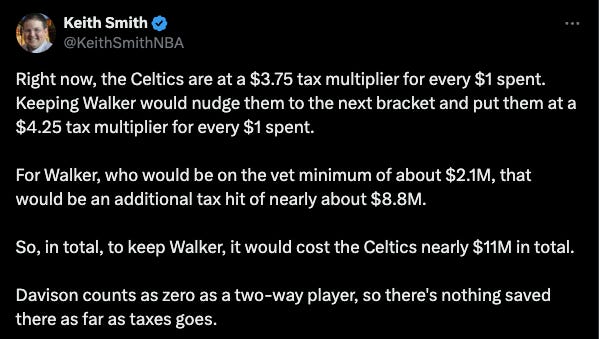Celtics' 3 options with Lonnie Walker IV
The Boston Celtics have 3 options available to them with Lonnie Walker IV
Quick note: There won’t be a Wednesday newsletter tomorrow. It’s my birthday this weekend, and as my mom will be working this weekend, I’ll spend tomorrow with her. I’m huge on family and making the most of our time with loved ones. I will be back on Thursday, though.
Since joining the Boston Celtics on an Exhibit 10 contract, Lonnie Walker IV has become the biggest talking point among the fanbase. A six-year NBA veteran, Walker brings experience and scoring to Joe Mazzulla’s bench. In truth, it’s unlikely the Celtics find a better talent to fill the final spot in the rotation for the upcoming season.
In an ideal world, Walker would be a slam-dunk addition. A no-brainer. An easy A. We’re not in an ideal world, though, especially not with the new CBA wreaking havoc across the league. And with that, Walker’s future remains unclear as we enter the final game of preseason, meaning the front office will have a difficult decision to make in the near future.
Here are the three options Boston has when it comes to Walker.
Sign him for the season.
On paper, this is the most logical option. When rounding out a roster, especially one as dominant as the Celtics, taking the best player available for the end of the bench is supposed to be the easy decision. When that team is in the second apron of luxury tax payments, easy choices don’t exist.
✅ Pros: We all know what Walker brings to the table. He’s a capable scorer across all three levels. He can work as a catch-and-shoot/catch-and-drive threat or as a ball-handler, taking some of the responsibility off Payton Pritchard’s shoulders with the bench unit.
Adding him to the rotation would add significant depth and competition to the bench. While his minutes are far from guaranteed, Walker could easily become a ‘break glass’ type of microwave scorer, especially in close games or when other roster members are having an off-night.
You don’t usually get someone as talented as Walker on an Exhibit 10 deal or a veteran minimum deal. Nine out of ten times, you snap him up for the season and look to put him in a position to earn a bigger contract elsewhere next season.
❌ Cons: It all starts with the cost of doing business. According to NBA cap expert Keith Smith, who was debating Walker’s chances of earning a roster spot on Twitter yesterday, adding Walker on a veteran minimum deal could cost the Celtics in the region of $11 million.
For me, the question then becomes: “Will Walker’s impact be a strong return on an $11 million investment?” When you’re staring down that type of luxury tax penalty, exploring the ROI is wise.
If we’re being honest, Walker will be the 10th guy in the rotation. Let’s map it out:
Jrue Holiday
Derrick White
Jaylen Brown
Jayson Tatum
Kristaps Porzingis
Al Horford
Payton Pritchard
Sam Hauser
Luke Kornet
There are nine guys who all played major roles in helping Boston win Banner 18 last season. I can’t see any of them being dislodged. That means Walker would be 10th on the depth chart at best. Mazzulla has consistently stuck to an 8-or-9-man rotation during the regular season.
Walker’s minutes would likely be similar to what we saw from Osahe Brissett last season — enough so you can feel the impact but not enough to put someone in the shop window.
So, ask yourself: Is an $11 million bill worthwhile for a player who will rack up a considerable number of DNPCDs next season?
And what if he is signed? Do you want him taking touches away from Pritchard after he proved himself in his second NBA Finals appearance? After he rose to the challenge of being the first guard off the bench, establishing himself as one of the more reliable bench guards in the NBA?
Is signing Walker worth those things? Do the Celtics need the scoring he brings over another wing defender to help cement the identity that ultimately led to a chip?
And all of this is before we explore the potential impact on the other bench guard on the roster, Jaden Springer, who reportedly came due to a recommendation from Sam Cassell. Doesn’t he provide the different skill set Boston needs on the perimeter?
There are a lot of questions to be asked, especially when the cost of doing business is so high.
And that leads us to option two.
Funnel him to the G-League.
First things first: I’m not talking about a two-way deal. You don’t need to be a two-way player to be in the G-League. The only difference is that a team owns a player’s rights when they’re on a two-way, whereas any other G-League player is essentially a free agent and can move freely.
I spoke about this on a recent podcast episode. Here’s a small snippet to share my thought process.
The Celtics Chronicle is a reader-supported publication. To receive new posts and support my work, consider becoming a free or paid subscriber.
Keep reading with a 7-day free trial
Subscribe to The Celtics Chronicle to keep reading this post and get 7 days of free access to the full post archives.


